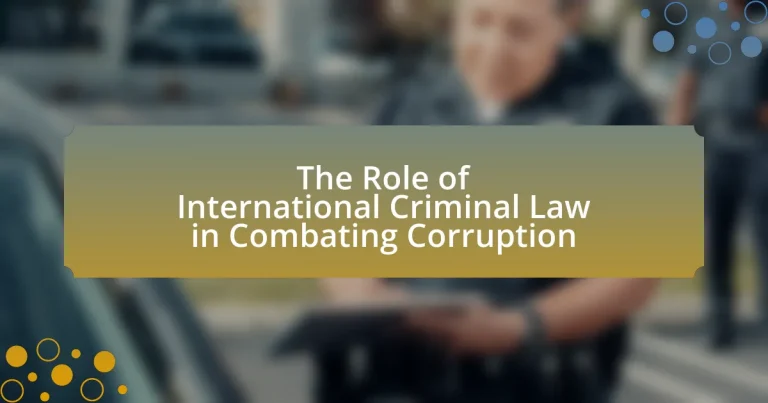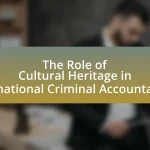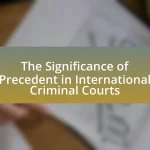International Criminal Law serves a vital function in the global fight against corruption by establishing legal frameworks that enable cross-border prosecution of corrupt practices. The article outlines how international treaties, such as the United Nations Convention against Corruption (UNCAC), define corruption, identify its key elements, and promote accountability and transparency in governance. It also examines the varying interpretations of corruption across jurisdictions, the social and economic impacts of corruption on global governance, and the mechanisms employed by international law to address these issues. Furthermore, the article discusses the challenges faced in enforcing anti-corruption measures, the role of international tribunals, and the importance of civil society in promoting accountability and transparency.
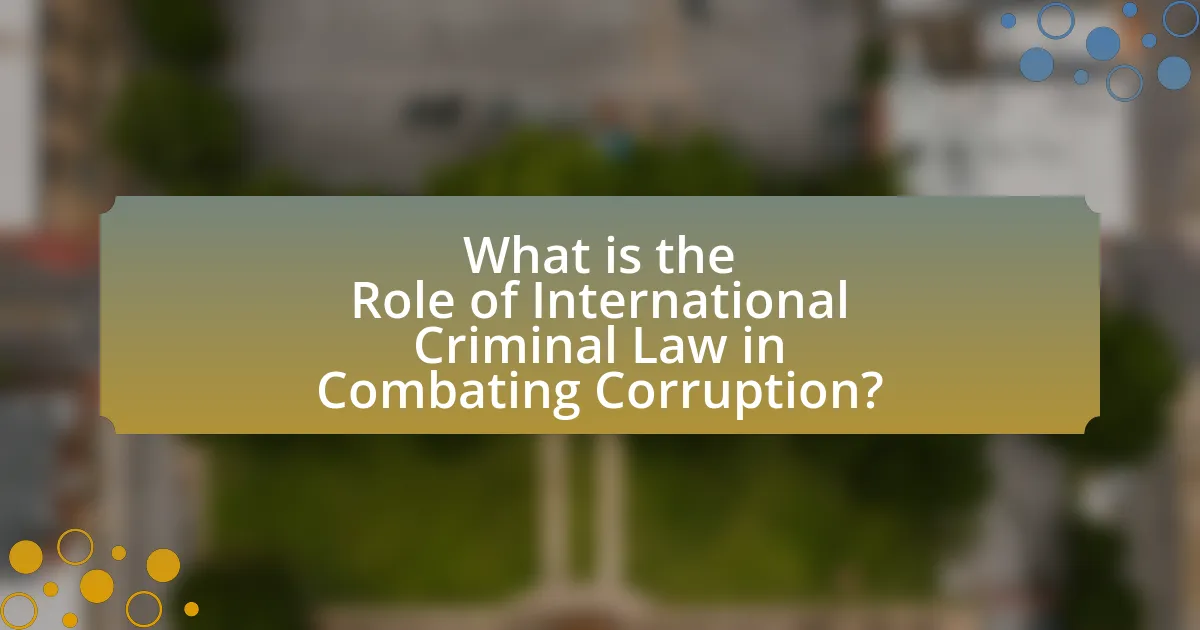
What is the Role of International Criminal Law in Combating Corruption?
International Criminal Law plays a crucial role in combating corruption by establishing legal frameworks that facilitate the prosecution of corrupt practices across borders. This body of law enables international cooperation among states, allowing for the investigation and prosecution of corruption-related offenses that often transcend national jurisdictions. For instance, treaties such as the United Nations Convention against Corruption (UNCAC) provide guidelines for countries to criminalize various forms of corruption, including bribery and embezzlement, thereby promoting accountability and transparency. Additionally, international tribunals can hold individuals accountable for corruption, reinforcing the principle that such acts undermine global justice and development.
How does International Criminal Law define corruption?
International Criminal Law defines corruption as the abuse of power for personal gain, which undermines the integrity of public institutions and the rule of law. This definition encompasses various acts, including bribery, embezzlement, and fraud, as outlined in international treaties such as the United Nations Convention against Corruption. These legal frameworks aim to establish accountability and promote transparency in governance, thereby reinforcing the global commitment to combat corruption effectively.
What are the key elements that constitute corruption under International Criminal Law?
The key elements that constitute corruption under International Criminal Law include bribery, embezzlement, abuse of power, and money laundering. Bribery involves offering, giving, receiving, or soliciting something of value to influence the actions of an official in their public capacity. Embezzlement refers to the misappropriation of funds placed in one’s trust or belonging to one’s employer. Abuse of power occurs when a public official uses their position to gain an unfair advantage or benefit. Money laundering involves concealing the origins of illegally obtained money, typically by passing it through a complex sequence of banking transfers or commercial transactions. These elements are defined in various international treaties and conventions, such as the United Nations Convention against Corruption, which outlines specific acts and behaviors that constitute corruption on a global scale.
How do different jurisdictions interpret corruption within the framework of International Criminal Law?
Different jurisdictions interpret corruption within the framework of International Criminal Law through varying legal definitions and enforcement mechanisms. For instance, the United Nations Convention Against Corruption (UNCAC) provides a broad definition of corruption, which many countries adopt, yet individual jurisdictions may emphasize different aspects, such as bribery, embezzlement, or abuse of power. In the European Union, corruption is often addressed through specific directives that focus on public procurement and financial interests, while countries like the United States utilize the Foreign Corrupt Practices Act to target bribery of foreign officials. These interpretations reflect local legal traditions and priorities, leading to discrepancies in enforcement and prosecution. For example, while some jurisdictions may prioritize prosecuting high-level officials, others may focus on grassroots corruption, illustrating the diverse approaches to combating corruption within the international legal framework.
Why is combating corruption important in the context of International Criminal Law?
Combating corruption is crucial in the context of International Criminal Law because it undermines the rule of law and facilitates serious crimes such as human trafficking, drug smuggling, and terrorism. Corruption erodes public trust in institutions, impedes economic development, and perpetuates inequality, making it a significant barrier to justice and accountability. The United Nations Convention Against Corruption, adopted in 2003, emphasizes the need for international cooperation in addressing corruption, highlighting its global impact and the necessity for a unified legal framework to combat it effectively. By addressing corruption, International Criminal Law aims to promote transparency, uphold human rights, and ensure that perpetrators of serious crimes are held accountable, thereby strengthening global governance and the integrity of legal systems.
What are the social and economic impacts of corruption on global governance?
Corruption significantly undermines global governance by eroding trust in institutions and exacerbating economic inequality. Socially, corruption leads to weakened public services, as funds intended for education, healthcare, and infrastructure are misappropriated, resulting in poorer outcomes for citizens. Economically, it distorts market mechanisms, discourages foreign investment, and increases the cost of doing business, as companies may need to engage in bribery to operate effectively. According to the World Bank, countries with high levels of corruption can lose up to 10% of their GDP annually due to inefficiencies and lost revenue. This creates a vicious cycle where corruption perpetuates poverty and social unrest, further destabilizing governance structures.
How does corruption undermine the rule of law and human rights?
Corruption undermines the rule of law and human rights by eroding public trust in institutions and enabling abuses of power. When officials engage in corrupt practices, they prioritize personal gain over legal and ethical standards, leading to a lack of accountability. This environment fosters impunity, where violations of human rights, such as discrimination and suppression of dissent, can occur without consequence. For instance, Transparency International’s Corruption Perceptions Index indicates that countries with high levels of corruption often experience significant human rights violations, as the rule of law is weakened and marginalized groups are disproportionately affected. Thus, corruption directly contributes to a cycle of injustice that undermines both legal frameworks and the protection of individual rights.
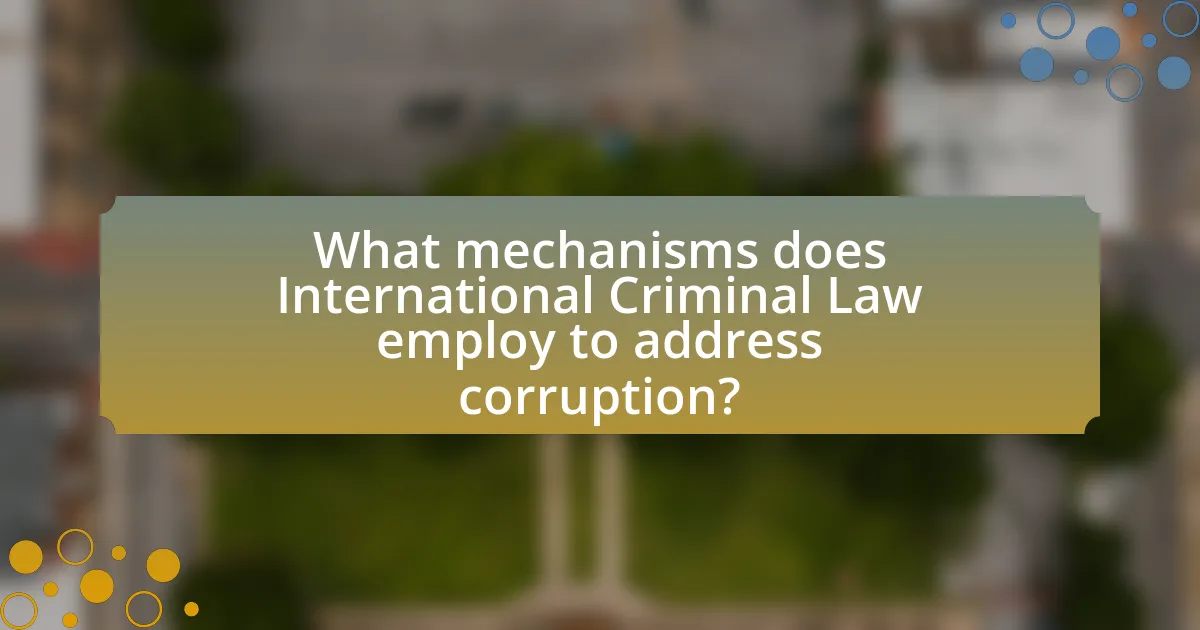
What mechanisms does International Criminal Law employ to address corruption?
International Criminal Law employs mechanisms such as the establishment of international treaties, the prosecution of individuals for corruption-related offenses, and the collaboration between states and international organizations to combat corruption. These mechanisms are exemplified by instruments like the United Nations Convention Against Corruption, which provides a legal framework for the criminalization of corruption and promotes international cooperation in investigations and prosecutions. Additionally, the International Criminal Court can prosecute individuals for corruption if it is linked to crimes under its jurisdiction, such as bribery in the context of war crimes or crimes against humanity. These frameworks and institutions collectively enhance accountability and facilitate the enforcement of anti-corruption measures globally.
How do international treaties and conventions facilitate the fight against corruption?
International treaties and conventions facilitate the fight against corruption by establishing a legal framework that promotes cooperation among countries, sets standards for anti-corruption measures, and enhances accountability. For instance, the United Nations Convention Against Corruption (UNCAC), adopted in 2003, obligates signatory states to implement comprehensive anti-corruption policies, including the criminalization of bribery and the establishment of effective law enforcement mechanisms. This treaty has been ratified by over 180 countries, demonstrating a global commitment to combat corruption through shared legal obligations and mutual assistance in investigations and prosecutions. Additionally, treaties like the OECD Anti-Bribery Convention encourage countries to adopt measures that prevent bribery of foreign public officials, further reinforcing international norms against corrupt practices.
What are the most significant international treaties related to corruption?
The most significant international treaties related to corruption include the United Nations Convention against Corruption (UNCAC), the Organisation for Economic Co-operation and Development (OECD) Anti-Bribery Convention, and the Inter-American Convention against Corruption. The UNCAC, adopted in 2003, is the first legally binding international anti-corruption instrument, promoting measures to prevent corruption and criminalizing various corrupt practices. The OECD Anti-Bribery Convention, established in 1997, focuses on combating bribery of foreign public officials in international business transactions, requiring signatory countries to implement effective measures. The Inter-American Convention against Corruption, adopted in 1996, aims to promote and strengthen the development of mechanisms to prevent corruption in the Americas. These treaties collectively provide a framework for international cooperation and legal standards to combat corruption globally.
How do these treaties promote cooperation among nations in combating corruption?
Treaties promote cooperation among nations in combating corruption by establishing a legal framework for mutual assistance, information sharing, and coordinated enforcement actions. For instance, the United Nations Convention against Corruption (UNCAC) encourages countries to adopt measures that enhance transparency and accountability, facilitating collaboration in investigations and prosecutions across borders. This framework is supported by specific provisions that require signatory states to assist each other in gathering evidence and extraditing offenders, thereby strengthening international partnerships in the fight against corruption.
What role do international tribunals play in prosecuting corruption?
International tribunals play a crucial role in prosecuting corruption by providing a legal framework for holding individuals accountable for corrupt practices that transcend national borders. These tribunals, such as the International Criminal Court (ICC) and various ad hoc tribunals, enable the prosecution of high-level officials and business leaders involved in corruption, thereby promoting international cooperation in combating this issue. For instance, the ICC has jurisdiction over crimes that include corruption when they are linked to other serious offenses, such as bribery related to war crimes or crimes against humanity. This linkage underscores the tribunals’ ability to address corruption within a broader context of international law, enhancing the enforcement of anti-corruption measures globally.
How have international tribunals addressed cases of corruption in the past?
International tribunals have addressed cases of corruption by establishing legal frameworks that prosecute individuals for corrupt practices, often linked to crimes such as bribery and embezzlement. For instance, the International Criminal Court (ICC) and ad hoc tribunals like the International Criminal Tribunal for the former Yugoslavia (ICTY) have included corruption-related charges in their mandates, emphasizing accountability for public officials. The ICTY, for example, prosecuted cases where corruption undermined the rule of law and contributed to conflict, demonstrating the intersection of corruption and international crimes. Additionally, the United Nations Convention Against Corruption, adopted in 2003, has influenced the work of various international tribunals by promoting cooperation among states to combat corruption effectively.
What challenges do international tribunals face in prosecuting corruption cases?
International tribunals face significant challenges in prosecuting corruption cases, primarily due to issues of jurisdiction, evidence collection, and political interference. Jurisdictional challenges arise because corruption often occurs within national borders, complicating the ability of international tribunals to assert authority. Evidence collection is hindered by the clandestine nature of corrupt activities, making it difficult to obtain reliable and admissible evidence. Additionally, political interference can obstruct investigations and prosecutions, as powerful individuals or governments may resist accountability. These factors collectively undermine the effectiveness of international tribunals in addressing corruption, as highlighted by cases where lack of cooperation from states has stalled proceedings.
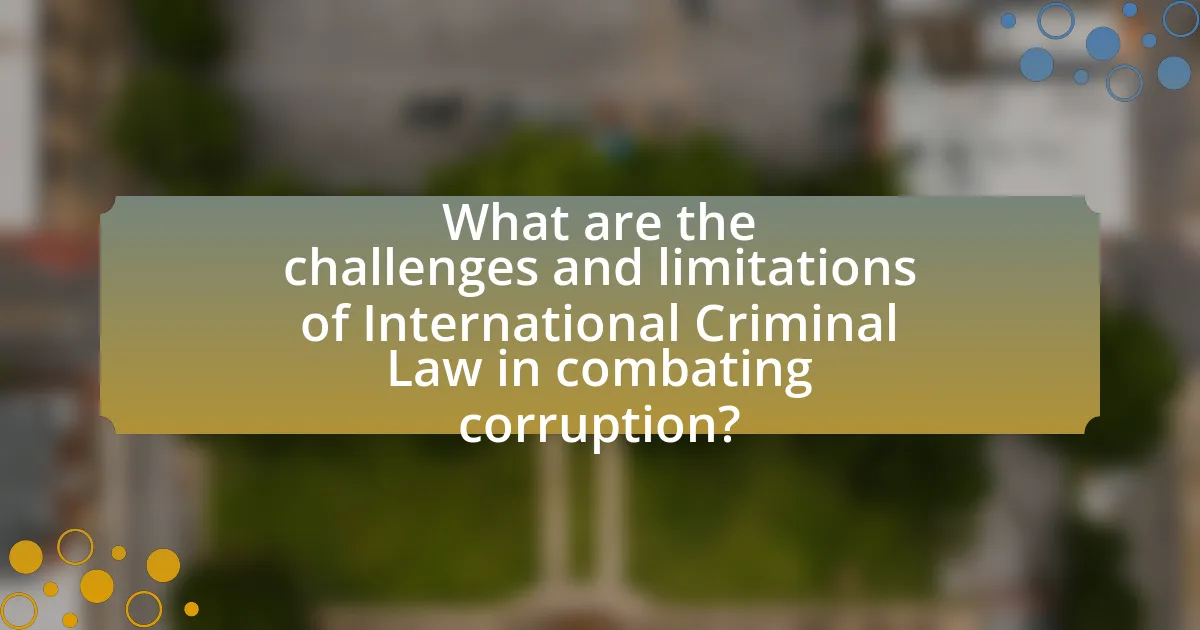
What are the challenges and limitations of International Criminal Law in combating corruption?
International Criminal Law faces significant challenges and limitations in combating corruption, primarily due to jurisdictional issues, lack of enforcement mechanisms, and the complexity of proving corrupt practices. Jurisdictional challenges arise because corruption often occurs within national borders, making it difficult for international bodies to intervene effectively. Additionally, the absence of robust enforcement mechanisms means that even when cases are brought forward, there is often insufficient political will or resources to pursue them. The complexity of proving corruption, which frequently involves intricate networks and covert operations, further complicates legal proceedings, as evidenced by the low conviction rates in corruption cases at the international level. These factors collectively hinder the effectiveness of International Criminal Law in addressing corruption comprehensively.
What obstacles hinder the effective enforcement of International Criminal Law against corruption?
The effective enforcement of International Criminal Law against corruption is hindered by several key obstacles, including lack of political will, insufficient legal frameworks, and challenges in evidence gathering. Political will is often lacking in countries where corruption is prevalent, as leaders may resist accountability measures that threaten their power. Additionally, many nations do not have robust legal frameworks that align with international standards, making prosecution difficult. Evidence gathering poses another significant challenge, as corruption cases often involve complex financial transactions and require international cooperation, which can be difficult to achieve. These factors collectively impede the enforcement of laws designed to combat corruption on a global scale.
How do political will and national sovereignty affect the prosecution of corruption?
Political will and national sovereignty significantly influence the prosecution of corruption by determining the extent to which governments prioritize anti-corruption measures and their willingness to cooperate with international legal frameworks. Political will is essential because it drives the commitment of state leaders to enforce laws against corruption, as seen in countries like Singapore, where strong political resolve has led to effective anti-corruption policies. Conversely, national sovereignty can hinder prosecution efforts, as states may resist external pressures or interventions that they perceive as infringing on their autonomy, exemplified by nations that reject international anti-corruption treaties. This interplay creates a complex environment where the effectiveness of corruption prosecution is contingent upon both the internal political landscape and the external legal obligations that nations are willing to accept.
What are the limitations of evidence collection in corruption cases?
The limitations of evidence collection in corruption cases include challenges such as the concealment of illicit activities, lack of cooperation from witnesses, and jurisdictional issues. Corruption often involves sophisticated methods to hide transactions, making it difficult for investigators to trace funds or gather concrete evidence. Additionally, witnesses may be reluctant to come forward due to fear of retaliation or lack of protection, which hampers the ability to collect testimonies. Jurisdictional issues arise when corruption spans multiple countries, complicating the legal processes and cooperation between different legal systems. These factors collectively hinder the effectiveness of evidence collection in prosecuting corruption cases.
How can International Criminal Law be strengthened to combat corruption more effectively?
International Criminal Law can be strengthened to combat corruption more effectively by enhancing international cooperation and establishing clearer legal frameworks for prosecuting corrupt practices. Strengthening mutual legal assistance treaties and creating specialized international anti-corruption courts can facilitate the prosecution of transnational corruption cases. For instance, the United Nations Convention against Corruption (UNCAC) provides a comprehensive framework that encourages countries to adopt measures for preventing corruption and promoting international cooperation. Additionally, increasing resources for international investigative bodies, such as the International Criminal Court, can improve their capacity to address complex corruption cases. These measures can lead to more effective enforcement and accountability in combating corruption globally.
What best practices can be adopted to enhance international cooperation in corruption cases?
To enhance international cooperation in corruption cases, countries should adopt best practices such as establishing mutual legal assistance treaties (MLATs) and creating joint investigative teams. MLATs facilitate the exchange of evidence and information between jurisdictions, which is crucial for prosecuting corruption that crosses borders. For instance, the United Nations Convention against Corruption encourages countries to enter into such treaties, thereby promoting collaboration. Joint investigative teams allow law enforcement agencies from different countries to work together on complex cases, improving efficiency and effectiveness. The European Union’s Eurojust has successfully implemented this model, leading to significant outcomes in transnational corruption cases. These practices not only streamline processes but also build trust among nations, essential for tackling corruption globally.
How can capacity-building initiatives improve the enforcement of International Criminal Law against corruption?
Capacity-building initiatives can enhance the enforcement of International Criminal Law against corruption by equipping legal institutions and law enforcement agencies with the necessary skills, resources, and knowledge to effectively investigate and prosecute corruption cases. These initiatives often include training programs, technical assistance, and the development of legal frameworks that align with international standards, which improve the overall capacity of states to address corruption. For instance, the United Nations Office on Drugs and Crime (UNODC) has implemented various capacity-building programs that have led to increased successful prosecutions of corruption-related offenses in several countries, demonstrating the effectiveness of such initiatives in strengthening legal enforcement mechanisms.
What practical steps can individuals and organizations take to support the fight against corruption?
Individuals and organizations can support the fight against corruption by promoting transparency and accountability in their operations. This can be achieved through implementing robust anti-corruption policies, conducting regular audits, and ensuring that financial transactions are open to scrutiny. For instance, organizations that adopt the principles of the United Nations Convention Against Corruption (UNCAC) demonstrate a commitment to ethical practices, which can significantly reduce opportunities for corrupt activities. Furthermore, individuals can report corrupt practices to relevant authorities and participate in civic education initiatives that raise awareness about the negative impacts of corruption. Studies show that countries with active civil society engagement and strong legal frameworks experience lower levels of corruption, highlighting the effectiveness of these practical steps.
How can whistleblower protections be improved to encourage reporting of corruption?
Whistleblower protections can be improved by implementing stronger legal safeguards, ensuring anonymity, and providing financial incentives for reporting corruption. Stronger legal safeguards, such as comprehensive anti-retaliation laws, can protect whistleblowers from workplace discrimination or termination, as evidenced by the Whistleblower Protection Act in the United States, which has led to increased reporting of fraud and abuse. Ensuring anonymity through secure reporting channels can encourage individuals to come forward without fear of exposure, as demonstrated by successful anonymous hotlines in various organizations. Additionally, offering financial incentives, similar to the bounty programs established by the U.S. Securities and Exchange Commission, can motivate potential whistleblowers by rewarding them for their contributions to uncovering corruption. These measures collectively create a safer and more encouraging environment for reporting corrupt practices.
What role does civil society play in promoting accountability and transparency in governance?
Civil society plays a crucial role in promoting accountability and transparency in governance by acting as a watchdog, advocating for policy changes, and facilitating citizen engagement. Organizations within civil society monitor government actions, report on corruption, and hold public officials accountable through various means, including investigations and public campaigns. For instance, Transparency International, a prominent civil society organization, has been instrumental in raising awareness about corruption and promoting anti-corruption measures globally. Their Corruption Perceptions Index provides concrete data that highlights the levels of corruption in different countries, thereby influencing public discourse and policy decisions. This active participation of civil society not only empowers citizens but also pressures governments to adhere to principles of transparency and accountability.
